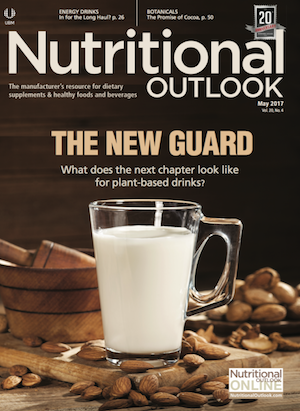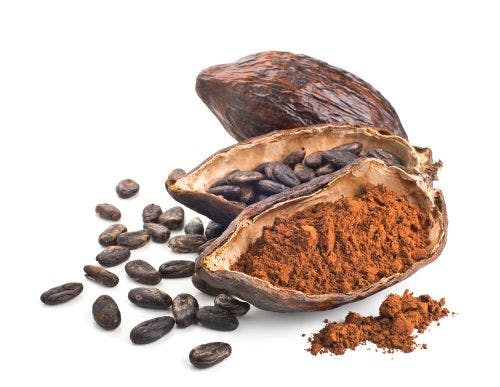The Growing Pet-Supplements Market
More companies and ingredients are targeting the pet-supplements market.
Photo © iStockphoto.com/damedeeso

A recent TechNavio market research report charts out a bright future for dietary supplements in the global pet-health market. The market researcher predicts a compound annual growth rate (CAGR) of 5.26% for the global pet-supplements market moving forward between 2016 and 2020.1
One of the contributing factors to this market growth will be the continuing increase in the number of patents in the ingredients marketplace, as manufacturers of pet-health dietary supplements continue to strive to formulate better products. Another significant influencing factor for growth in the global pet dietary supplements market is the onset of a number of age-related health issues in pets of all kinds, which can lead to a number of disorders.
Outlook in the United States
Projections for pet supplements and nutraceuticals in the United States mirror the generally positive outlook for supplements in the human-health market. According to market researcher Packaged Facts, projected retail sales for pet supplements and nutraceutical treats in the U.S. continue to be promising and are expected to grow through 2017, to an estimated $1.6 billion.2
“The pet market is split approximately 50% dog and cat, and 50% for horses,” says Bill Bookout, founder and CEO of the National Animal Supplement Council (NASC; Valley Center, CA), pointing out that due to a horse’s larger size, a horse will naturally account for a higher percentage of ingredients. NASC is a nonprofit trade association devoted to protecting and enhancing the health of companion animals.
Bookout adds, “Most people think of their pets as their children or their own extended family members. We see the trends for animal supplements following similar trends for human supplements.” What’s also promising for this market, he says, is “as consumers become educated on human supplements, that [knowledge] extends naturally to animal supplements as well.”
Bookout ticks off a list of ingredients that he says still command a lot of attention in the pet-supplement space. Glucosamine, chondroitin, MSM, boswellia, yucca, and other joint-support products are still popular ingredients in the market for supplements and nutraceutical treats for dogs, cats, and horses. Bookout also says that omega fatty acid are popular for seasonal allergies, itchy and flaky skin, unwanted or excessive shedding, and skin and coat health. For healthy horse hooves, omega fatty acids are often combined with biotin. Other ingredients he feels have promise are probiotics (“up-and-coming,” he says) and weight-management ingredients “to help address obesity- and health-related issues for pets.”
Here are some additional ingredients to watch for in the pet supplements and nutrition industry.
Joint-Health Support
Joint support continues to be a pressing need for our aging animal friends. Luckily, those looking for natural solutions can find some good options in the ingredients space. In 2015, the joint-health category represented a whopping 39% share of the pet-supplements market, according to TechNavio’s market research report, and is forecasted to grow further.
One ingredient option is NEM, a branded natural ingredient obtained from eggshell membrane and supplied by Stratum Nutrition (Carthage, MO). It helps to support joint comfort, flexibility, and a healthy range of motion.
Last fall, Stratum, along with ESM Technologies (Carthage, MO), the supplier and manufacturer behind NEM, announced the results of a first-of-its-kind canine study3 on the ingredient in dogs experiencing joint discomfort and function. The six-week, double-blind, randomized, placebo-controlled clinical trial was conducted at eight veterinary clinics.
Researchers found that NEM eggshell membrane significantly improved joint function and joint pain compared to placebo at one week (22.5% improvement according to a Canine Brief Pain Inventory (CBPI) questionnaire, and 19.4% CBPI improvement, respectively), but noted that the results “just fell shy of significance” after six weeks of supplementation.
During the study, researchers also tracked serum levels of c-terminal cross-linked telopeptide of type-II collagen (CTX-II), a biomarker for cartilage degradation. CTX-II levels were found to be substantially reduced at the end of the study for dogs taking NEM versus the placebo.
Another ingredient popular in the joint-health space is Regenasure, a branded glucosamine ingredient that is vegetarian-sourced and supplied by Cargill (Minneapolis, MN). It has been shown to support cellular joint health and healthy tissues.
In one study4, researchers evaluated whether glucosamine has beneficial effects in cellular and animal models of osteoarthritis, and whether it can activate autophagy in vitro and in vivo. The researchers found that glucosamine may help activate autophagy and support healthy joints in the aging process.
Ingredients like these will continue to find demand in the animal space. Says TechNavio, “The demand for [joint-health] supplements will continue to increase worldwide in the coming years as they help in treating arthritis and crippling effects of osteoarthritis, which are very common in aging dogs….With the growing awareness about joint problems in their pets, several pet owners are increasingly demanding joint-health supplements as a preventive measure, which in turn, will be a major factor contributing to the growth of this market.”
Weight Management
Interest in weight-management interventions is growing in the pet sector. Reports point to an increase in the number of obese pets along with obesity-related health conditions in pets, including damaged joints and ligaments, and digestive, heart, and other disorders.5-7
“For many of us, pets are like members of our families,” says Mitch Skop, senior director, new product development, Pharmachem Laboratories (Kearny, NJ). “So, it may not come as a surprise that pets often suffer from some of the same maladies as humans, including being overweight and obese. In fact, there is a major trend in the pet food industry for foods that meet some of the same health requirements as the human owner, including that they be organic, non-GMO, low-carb, to name a few.”
One particular branded ingredient, Phase 2 Carb Controller, a white kidney bean (Phaseolus vulgaris) ingredient supplied by Pharmachem, has been clinically shown to promote weight loss and reduce the digestion of starch. It is believed to possess benefits for both human and pet health.
In a 2004, 17-subject study8, Phase 2 Carb Controller was shown to help canine subjects lose weight. According to Pharmachem Laboratories, during the eight-week canine trial, 88% of the dogs in the study lost weight after consuming a supplement containing Phase 2 Carb Controller, without any additional changes in diet or exercise. The study also showed that 76% of the dogs that took Phase 2 Carb Controller lost inches around their abdomen, and none of the dogs gained inches in that area.
Digestive Support
Tracking along with the human gastrointestinal-health (GI) market, the demand for pet supplements for GI health is reported to be increasing, too. Numerous ingredients, including digestive enzymes and probiotics, can lend support in this area. And although animals’ GI tracts contain different types of bacteria compared to those found in humans, unique formulations of prebiotics, probiotics, and digestive enzymes can also help animals maintain the balance of good and bad bacteria levels, and promote healthy digestion in pets just as they do in humans. In particular, TechNavio’s report notes that, “The demand for probiotics has increased among the dog owners to improve gastrointestinal problems in their pets.”
One company, Hyperbiotics (Henderson, NV), says that it has created a probiotic ingredient composed of six probiotic strains that are found to reside in the animal gut and that helps support and balance dog and cat gut health. The ingredient is called Pro-Pets, and Hyperbiotics produces it using the company’s patented Bio-tract time-released process, which ensures that probiotics bypass the acids in the animal’s stomach and are delivered to the intestinal tract.
The company says that the product is formulated with three billion CFU and requires no refrigeration because Hyperbiotics uses its patented LiveBac process, which ensures an eighteen-month shelf life.
More Research
The hope is that more companies will study the effects of their ingredients in pet populations. Just this April, Lonza (Basel, Switzerland) announced the results of a brand-new study9 on the companion-animal version of its L-carnitine ingredient, Carniking, in working dogs (Labroador Retrievers). Published in the Journal of Nutritional Science, researchers found that supplementing the dogs with Carniking resulted in positive effects related to activity intensity, body composition, muscle recovery, and oxidative capacity.
“The positive results clearly demonstrated that Carniking L-carnitine helps recovery after exercise in active dogs and has significant effects on muscle mass,” said Dr. Craig Coon, CEO and co-owner for Four Rivers Kennel LLC (Walker, MO), where the study was conducted. “These effects provide the first evidence of Carniking L-carnitine’s specific positive impact on working dogs. This finding is promising as the increase in lean mass, recovery, and activity can provide better quality of life and function for working animals and house pets, for example.”
Also read:
Pet Food Trends in 2017: Clean Label, Healthy, and Premium
Pet Health Supplements: Paw-Portunity Knocks
References:
- TechNavio. “Global Pet Dietary Supplements Market 2016–2020.” (September 2016). www.technavio.com/report/global-pet-supplies-global-pet-dietary-supplements-market-2016-2020
- Packaged Facts. “Pet Supplements Market Research Reports & Industry Analysis.” www.marketresearch.com/Consumer-Goods-c1596/Consumer-Goods-Retailing-c80/Pet-Supplements-c1641/
- Ruff KJ, et al., “Effectiveness of NEM brand eggshell membrane in the treatment of suboptimal joint function in dogs: a multicenter, randomized, double-blind, placebo-controlled study,” Veterinary Medicine: Research & Reports, vol. 7 (August 2016): 113–121
- Carames B et al., “Glucosamine activates autophagy in vitro and in vivo,” Arthritis & Rheumatism, vol. 65, no. 7 (July 2013): 1843-1852
- Deborah Linder, DVM, DACVN, “Top 5 Clinical Consequences of Obesity.” Clinician’s Brief. (February 2014): 19-21. www.cliniciansbrief.com/sites/default/files/attachments/Top%205%20Clinical%20Consequences%20of%20Obesity.pdf
- Cornell Feline Health Center, “Feline Obesity.” Cornell University College of Veterinary Medicine. (2014) www.vet.cornell.edu/fhc/Health_Information/obesity.cfm
- Packaged Facts, “Senior, Weight Management and Special Needs Pet Products in the U.S. 2nd Edition.” (Feb 29, 2016) www.packagedfacts.com/Senior-Weight-Management-9858015/
- Rosenblatt S et al., “Use of commercial starch blockers in canine weight loss.” Journal of American Holistic Veterinary Medical Association, vol. 23, no. 2 (July–September 2004): 43-46
- Varney JL et al., “Utilisation of supplemented L-carnitine for fuel efficiency, as an antioxidant, and for muscle recovery in Labroador retrievers,” Journal of Nutritional Science, vol. 6, no. 8 (2017): 1-9

Prinova acquires Aplinova to further increase its footprint in Latin America
April 7th 2025Prinova has recently announced the acquisition of Brazilian ingredients distributor Aplinova, which is a provider of specialty ingredients for a range of market segments that include food, beverage, supplements, and personal care.






















